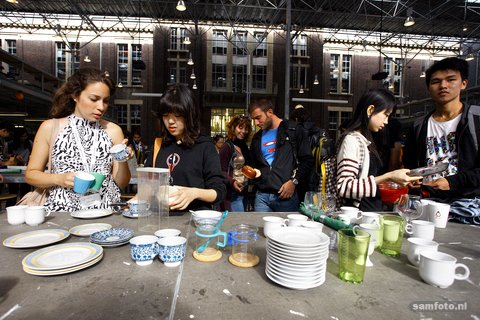New international students are welcomed to TU Delft with tours, talks, team-building games and a bazaar.
Getting settled into a new country was never as much fun. As 1,000 international students geared up to start the new session at TU Delft, the university helped them settle in with a two-week long orientation programme.
/p>
Full of ‘survival activities’, the Introduction Programme 2012 was aimed at introducing students to the university and to Delft with some serious fun. Beach parties, movie nights, walking tours of the town and its supermarkets, academic sessions on team building and communication and Dutch speed dating (to make new Dutch friends) were some of the many activities. Students were also given four-part Survival Journals, which included details about the activities, anecdotes about the Netherlands, information about supermarkets, and even recipes from other international students.
“One of the other interesting things we gave students is a poster designed by the Delft International Student Society. We noticed that students usually throw away most of the information pamphlets they receive, so, we thought we should give them the same information in the form of something that can be for keepsake. The decoratively designed poster can be put up in rooms, behind doors or in the bathroom,” says Germaine Poot, programme manager of the Introduction Programme.
Sports also play a major role in the festivities. “We also held TU-lympics for students. Besides Dutch sports, games like rope pulling were organised in the Sports Centre,” adds Poot. The winning teams of the TU-lympics Cup will be awarded special prizes during the closing ceremony on August 30, which will also feature multicultural song and dance performances by international student associations of the various countries.
One of the popular events of the programme was the Freecycle Bazaar, which was co-organised by Ecolution. Founded in 2012, Ecolution is a student organisation working on sustainability and preserving resources on campus. “Recycling and reuse fits very well within our goals, so the bazaar seemed like a great idea. It also gave us a very visible platform, one we hope will encourage new students to attend the sessions we’ve planned, and, hopefully, even volunteer with us,” said board member Dhariyash Rathod.
Ecolution invited staff, students and professors to donate items that were no longer of use to them to new students free of cost. The bazaar opened to students at 10 a.m. on August 25 and within an hour most items had been claimed. “It was a lot more successful than we expected it to be. People donated lots of things – clothes, cups, plates, a laptop, music systems, and old keyboards. We even got a foot-massager in decent working condition, but no one seemed to want it,” said board member Nickolas Chrysochoidis. “Whatever is left from the bazaar will be donated to the church,” adds Eirini Starvou, another board member.
For the new students, this was a great idea. “It was a great initiative for international students. It’s not just that students who were here early got a lot of free stuff, but these were all good quality things that people need,” said Anand Sundaresan (21), who has just started his MSc in Systems and Control.



Comments are closed.